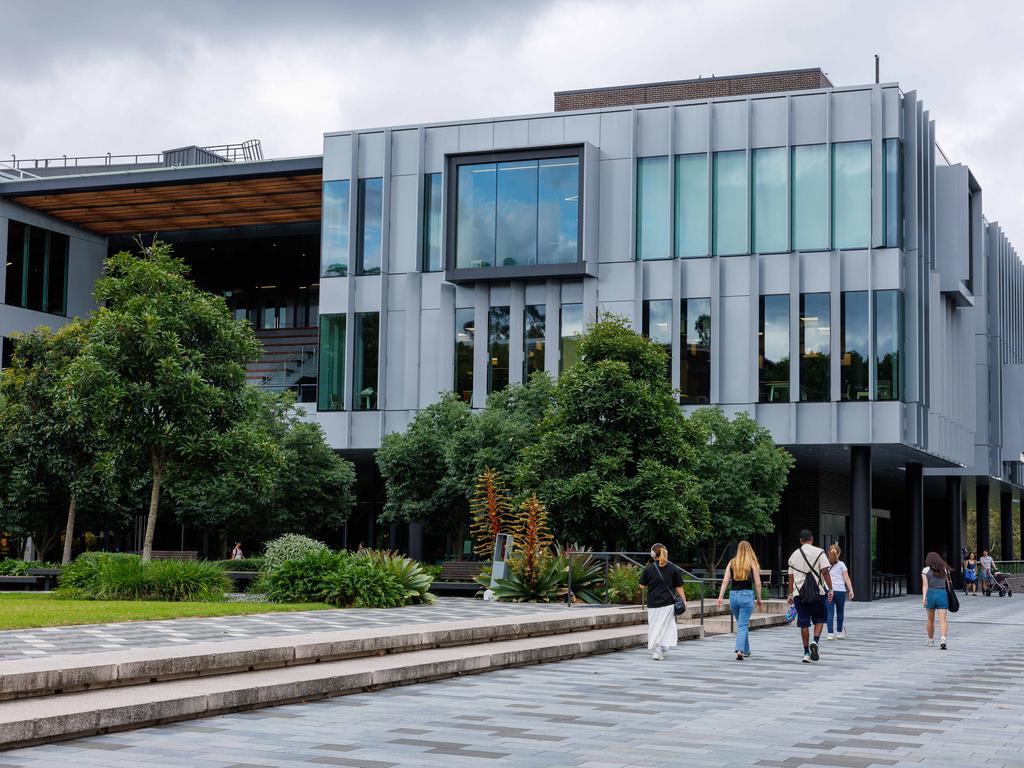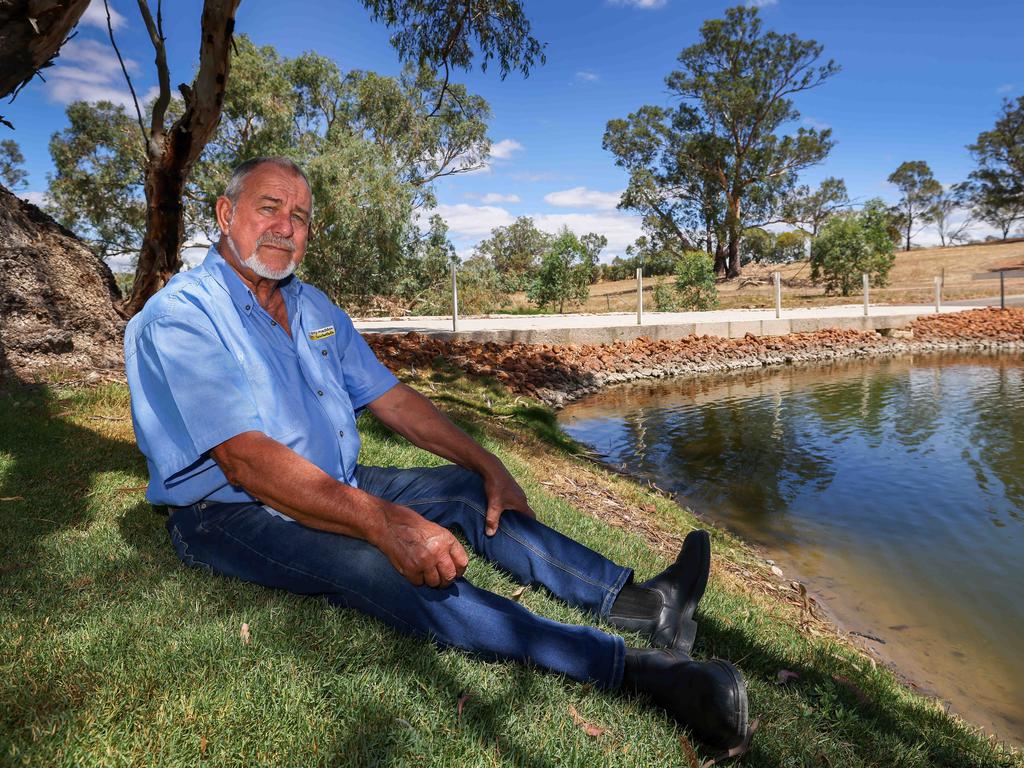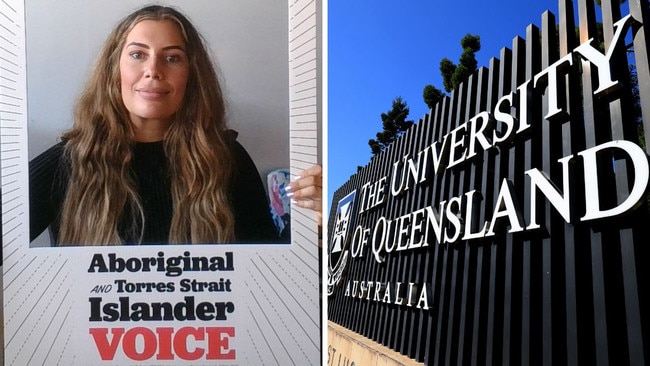
It makes my heart soar to learn my taxes go towards paying the salary of University of Queensland law lecturer and Bundjalung/Kungarakany woman Dr Dani Linder, who, as this masthead reported this week, is “indigenising” UQ’s law curriculum.
This is a vitally important role, because the law as it stands is a colonial construct of old white men and thus totally unsuited for modern Australia. Ideally, our legal system should instead reflect the values and beliefs of the 3.8 per cent of Australians who identify as Indigenous, or should I say the values and beliefs of Indigenous activists such as Linder.
You would think young law students would be queuing up to hear this luminary speak. But as we learned from an audio recording of March 2024 shared with The Australian, Linder was outraged to discover not all of her Foundation of Law students were spellbound by her words.
Judging by her tone when she berated her students, she has never before had to suffer such impertinence. Her take on their alleged indifference was they had decided that a curriculum which, in Linder’s words, “prioritises … Indigenous perspectives” wasn’t much chop.
“There were tens of you that got up and decided that wasn’t important, and instead you were pretty unprofessional and walked out,” she remonstrated. “Watch what you say and what you do if you want to do well in your law degree, because being politically active in a way that’s protesting against my inclusion of Indigenous perspectives and up and leaving … that is really inappropriate, and I won’t be tolerating it.”
That is exactly the way one should speak to errant schoolchildren, I say. Warning the students who had walked out that she would “remember their faces,” Linder implied this would not only have consequences for their assessments but also their careers.
“I can tell you now if you want to get involved in any work while you’re doing your law degree, you’re not going to get hired and you’re not going to last if this is the type of behaviour that you’re engaging with,” she said.
That’s the stuff, Dr Linder. What a wonderful role model you are for your students. As for telling them in the same breath, “I am an expert in my field and recognised internationally and nationally for the work that I’ve done,” I have one question. What subject is your expertise, aside from Curriculum Karen 101?
Here is a thought. If Linder did feel so strongly about students leaving her lecture early, instead of pre-judging them she could have privately approached each to ascertain why they left. After all, they may have had a good reason. Could it be the self-declared law expert is unfamiliar with the concept of natural justice?
Inspired by Linder’s mission to indigenise the law curriculum, I decided to educate myself by researching historical newspapers in the National Library of Australia’s Trove collection. I have since discovered some fascinating information about Indigenous jurisprudence, and I am sure Linder will recognise my efforts and perhaps even incorporate the material I have found in her teachings.
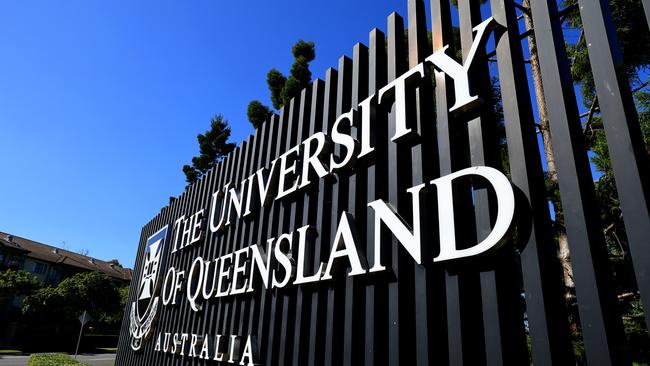
To begin with, I learned that vicarious liability has long been recognised in First Nations law. Let’s take the case of three Indigenous men in Broome who in 1923 were found guilty of murdering an Aboriginal woman. Her ‘crime’ was being the wife of a man who had killed a woman and then absconded. As the Casino and Kyogle Courier and North Coast Advertiser reported:
“Their tribal law demanded that his [wife] should pay the penalty of his crime, and she calmly submitted, while the accused stabbed herein, the stomach with a spear. The head of the spear broke off in the wound, which was not fatal. She was then stabbed again with the spear shaft, and as she was still alive, two of the accused held her while the other twisted her head round till her neck was broken.”
And let’s not forget First Nations criminal law. Reporting in 1980 on the Northern Territory case of seven Indigenous men who had pleaded guilty to conspiring to rape two girls aged 13 and 14, the Canberra Times cited one Dr Robert High Leyton, an anthropologist with the Northern Land Council.
“Pack rape of young girls of the tribe was a known punishment if they breached certain tribal laws,” he said.
Then there is First Nations property law. In 1936, Monsignor Xavier Gsell, then in charge of the Bathurst Islands mission, told the Brisbane-based Telegraph the influx of Japanese pearl divers had led to the trading of Indigenous women by their menfolk for goods such as tobacco and flour.
“He knew that girls as young as ten years had been traded,” reported the Telegraph. “The girls at first protested but afterwards went aboard the luggers.”
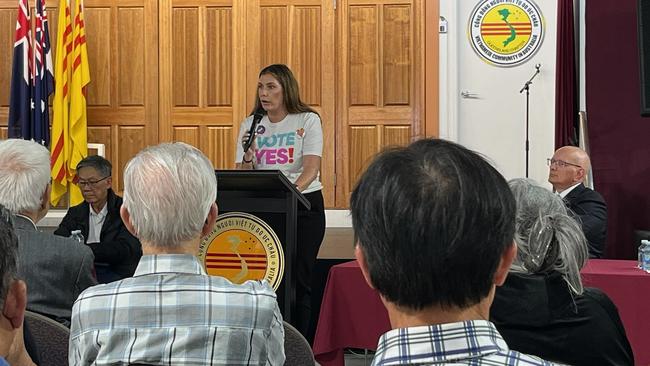
It was a practice The Argus also noted that same year.
“Questioning of the women revealed that they had either boarded the luggers for the lavish supplies of tobacco offered or had been beaten into submission by their husbands, who had been promised food by the Japanese,” the newspaper reported.
I realise these facts about Indigenous laws are unpalatable and belie the official narrative. But as noted by Linder and her co-authors in a 2023 paper, it is imperative we change “the mainstream discourse through truth-telling … to mitigate inherent racial biases within society”. And presumably truth-telling includes dispelling romantic but fallacious notions about what indigenising a law curriculum would involve – right, Dr Linder?
Turn it up. If a brave student raised these examples in Linder’s class, I guarantee this entitled lecturer would immediately start screeching, as well as claim these inconvenient facts breach her right to a culturally safe workplace.
But what of the students’ right to be treated in a respectful manner by their lecturers? There is no small irony in Linder’s haranguing students while waving the “I want to make it perfectly clear that there is a school code of conduct for students to follow” stick.
As Janet Albrechtsen noted yesterday, Linder’s actions raise questions about whether she is abiding by UQ’s staff code of conduct, which mandates that employees must not engage in bullying, harassment, discrimination, intimidation, humiliation or threatening behaviour. But instead of conducting a full investigation into Linder’s unseemly meltdown, UQ administrators have wet their pants. They claim their so-called internal review found nothing wrong and that the “lecture delivery and course content” were appropriate.
Those parents with a budding law student in their final year of school should take note. Remind your children they will not get much change from $100K for a law degree, and as such they should ensure prospective institutions deliver value and provide for open debate. The last thing your offspring need is to pay all that money only for a shouty activist to browbeat them. In short, let them know a UQ law degree is synonymous with uselessness.
Incidentally, I am not necessarily opposed to the inclusion of Indigenous perspectives in law curricula. Some are informative and relevant. For example, in my research I came across a Herald article from 1939 which told the story of Father Ernest Worms, a missionary priest who had lived with a tribe in WA’s Kimberley Region for ten years.
The tribe had a “complex legal system”. he said, A case in point was that a “married man is forbidden to speak to his mother-in-law”. Neither could he look at her, and when he was out bush, he had to “carefully avoid her tracks”.
Do you know what? There is much Indigenous law can teach us.


